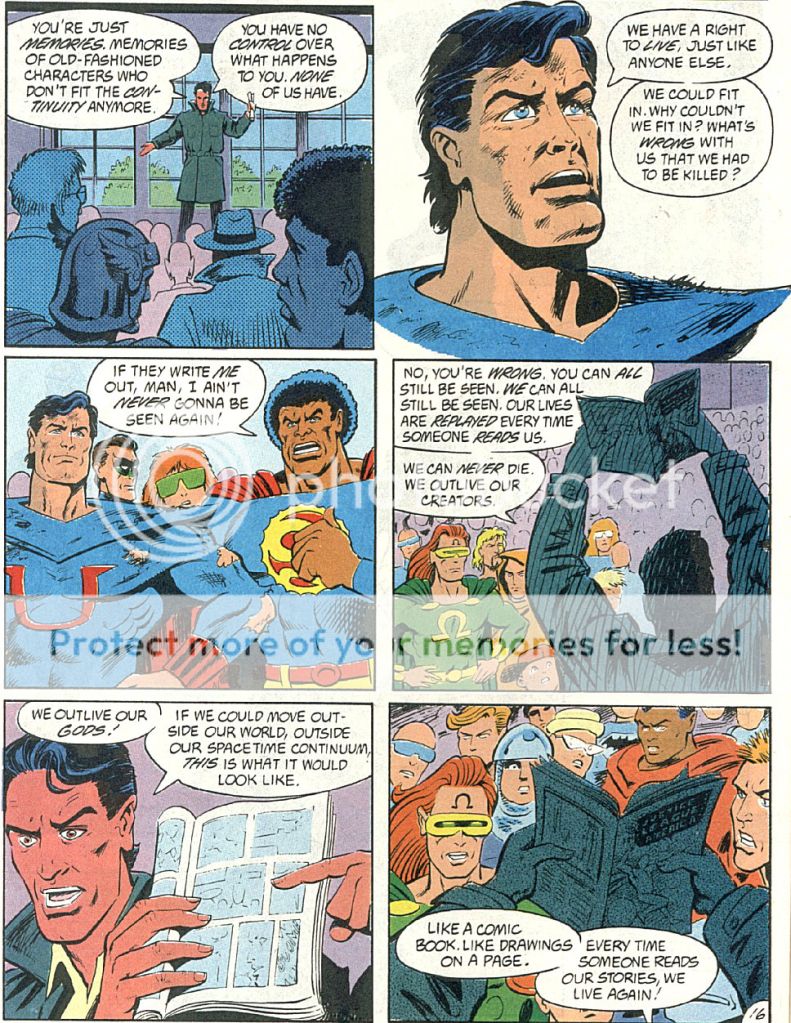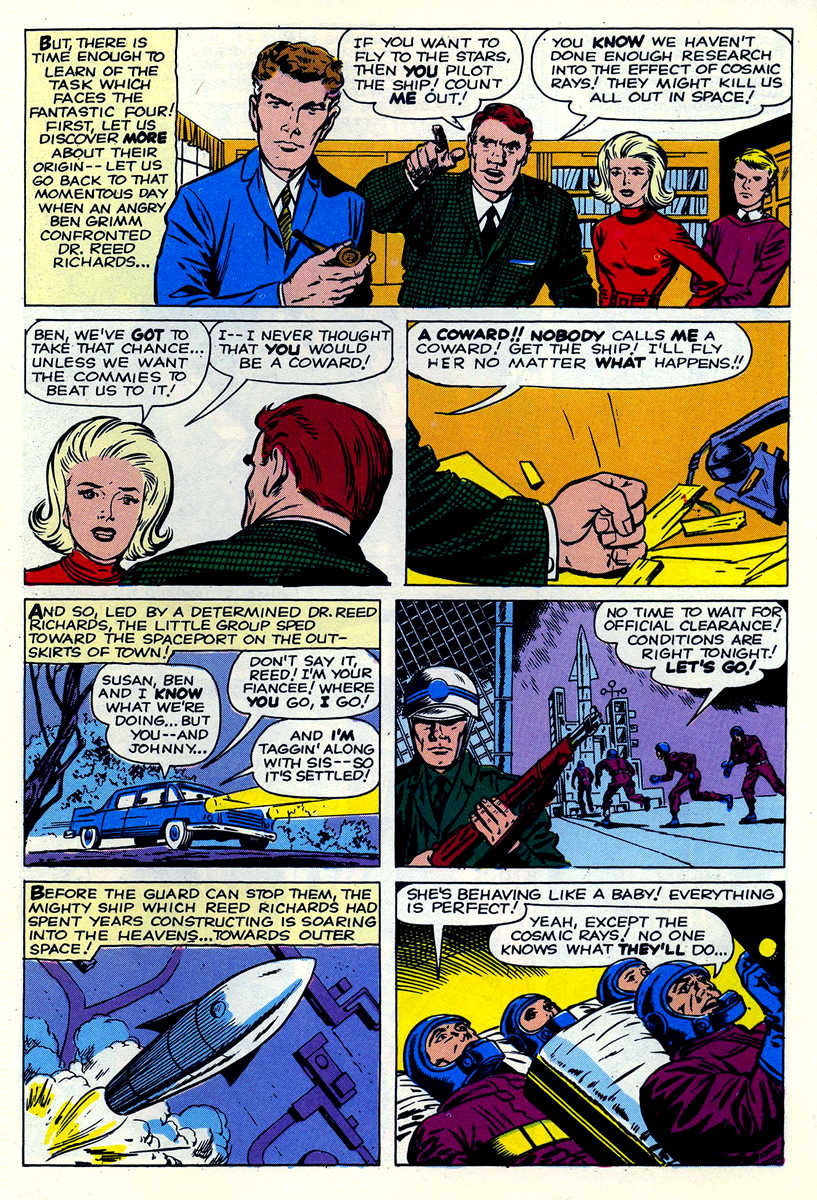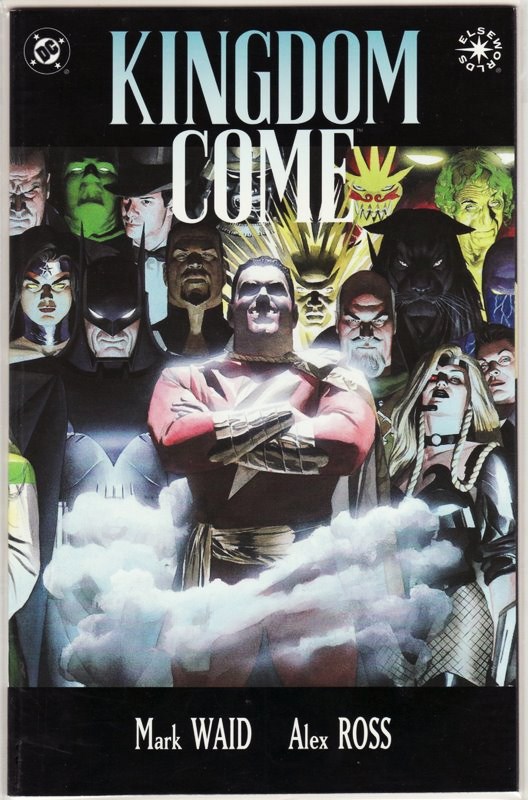Does Continuity Limit Comics?
Marvel has a major change coming to the
Avengers and related titles with their upcoming “Time Runs Out” storyline. Earlier this week, Newsarama posited that the
storyline could mean a company-wide reboot, like DC did with the “New 52.” One of the motivations for Marvel, just as it was for DC, would be to get a clean slate of characters without the baggage of years of continuity. So that raises the question: is the type of company-wide continuity we see in comics from Marvel and DC good or bad for comics overall?

When I discuss the idea of continuity, I’m talking about the notion that all of the stories in
Amazing Spider-Man occur to the same character and occur in the same universe that all of the stories in
Avengers occur. There is an unbroken through-line for Peter Parker. So in most cases, stories build on previous stories and events. This is different from episodic, unconnected storytelling, like you might see in a newspaper comic strip, where each story is separate and doesn’t build or reference events from previous strips.
The bedrock of continuity has always been one of the things that made superhero comics enjoyable. After decades of a character’s adventures in comics, there is loads of trivia and minutia for fans to digest. It’s also particularly enjoyable to see a great writer and artist address elements of a character’s past and give a new take on this. For example, one of Grant Morrison’s early successes was the offbeat DC series
Animal Man. While most of the story is self-contained, there are chapters that clearly reference old DC continuity and show it in a new light.

At the same time, tight continuity poses problems all the time. Marvel and DC produce comics with shared characters, with decades of stories written by hundreds of writers. If a writer decides to do something daring with a character, such as kill a character, another creator can’t use that character unless there is an allowance made to the previous kill. The life/death/life/death cycle of Jean Grey is a good example.
This shared continuity and disagreements over the “right” way to use a character has caused many instances of one writer abandoning the status quo established by a previous writer because he/she didn’t agree with it. These type of back and forth tug of wars with characters can cause havoc with continuity. After all, you can’t have a retcon without the con(tinuity). After Brian Michael Bendis made Scarlet Witch an unstable villain in
Avengers Disassembled and
House of M, it has taken quite a bit of
tweaking to make her a usable hero again.

It’s not only controversial writing or poor editorial choices that make continuity problematic at times. The accumulation of stories and passage of time can make it difficult for continuity to make sense. The Fantastic Four were originally so desperate to get into space because of the Cold War space race. When the origin is now referenced, it is updated in the comics to a more modern environment, so that Reed Richards and company don’t have to be in their 60’s or 70’s.
One of the primary motivations for DC’s “New 52” or Marvel’s Ultimates Universe was to give the characters a clean slate, so that new readers can approach the stories without having to understand six decades of backstory. X-Men comics, where there have often been many titles and many stories involving time travel and alternate dimensions, has produced some very convoluted continuity.

A radical notion is banish the notion of continuity altogether. If writers and artists are freed to create radical stories without concern of what is happening to the character in other titles, they can often create some amazing work. DC has a number of successes with this, when they called their non-continuity stories “Elseworlds.” Marvel has done this in many permutations, frequently in an anthology series called
What If?. Would Marvel and DC be better served by letting the characters be pliable and remolded as often as needed?
It’s an interesting concept that could yield some really great comics, but I wonder about the long-term viability of non-continuity comics. Would fans, both old and new, lose interest if stories were not building upon previous stories? Comic titles would essentially become a series of unrelated story arcs. While a policy of no continuity does not preclude the notion of a shared universe, it does make it pretty pointless. What’s the appeal of having Fantastic Four appear in a Spider-Man comic if they are written as different character than what’s in their own title?

Personally, I hope that “Time Runs Out” doesn’t end the current Marvel Universe. I’m a fan of the weird corners of continuity. While it’s frustrating to see a writer mistreat or misinterpret your favorite character, it doesn’t mean you can’t enjoy that character ever again. As a fan, I think you come to form your own continuity of stories that you ascribe to the character and others that you ignore (ahem, “Clone Saga”). I truly think that the decades of stories and deep history enriches comics much more than it limits them.
 When I discuss the idea of continuity, I’m talking about the notion that all of the stories in Amazing Spider-Man occur to the same character and occur in the same universe that all of the stories in Avengers occur. There is an unbroken through-line for Peter Parker. So in most cases, stories build on previous stories and events. This is different from episodic, unconnected storytelling, like you might see in a newspaper comic strip, where each story is separate and doesn’t build or reference events from previous strips.
The bedrock of continuity has always been one of the things that made superhero comics enjoyable. After decades of a character’s adventures in comics, there is loads of trivia and minutia for fans to digest. It’s also particularly enjoyable to see a great writer and artist address elements of a character’s past and give a new take on this. For example, one of Grant Morrison’s early successes was the offbeat DC series Animal Man. While most of the story is self-contained, there are chapters that clearly reference old DC continuity and show it in a new light.
When I discuss the idea of continuity, I’m talking about the notion that all of the stories in Amazing Spider-Man occur to the same character and occur in the same universe that all of the stories in Avengers occur. There is an unbroken through-line for Peter Parker. So in most cases, stories build on previous stories and events. This is different from episodic, unconnected storytelling, like you might see in a newspaper comic strip, where each story is separate and doesn’t build or reference events from previous strips.
The bedrock of continuity has always been one of the things that made superhero comics enjoyable. After decades of a character’s adventures in comics, there is loads of trivia and minutia for fans to digest. It’s also particularly enjoyable to see a great writer and artist address elements of a character’s past and give a new take on this. For example, one of Grant Morrison’s early successes was the offbeat DC series Animal Man. While most of the story is self-contained, there are chapters that clearly reference old DC continuity and show it in a new light.
 At the same time, tight continuity poses problems all the time. Marvel and DC produce comics with shared characters, with decades of stories written by hundreds of writers. If a writer decides to do something daring with a character, such as kill a character, another creator can’t use that character unless there is an allowance made to the previous kill. The life/death/life/death cycle of Jean Grey is a good example.
This shared continuity and disagreements over the “right” way to use a character has caused many instances of one writer abandoning the status quo established by a previous writer because he/she didn’t agree with it. These type of back and forth tug of wars with characters can cause havoc with continuity. After all, you can’t have a retcon without the con(tinuity). After Brian Michael Bendis made Scarlet Witch an unstable villain in Avengers Disassembled and House of M, it has taken quite a bit of tweaking to make her a usable hero again.
At the same time, tight continuity poses problems all the time. Marvel and DC produce comics with shared characters, with decades of stories written by hundreds of writers. If a writer decides to do something daring with a character, such as kill a character, another creator can’t use that character unless there is an allowance made to the previous kill. The life/death/life/death cycle of Jean Grey is a good example.
This shared continuity and disagreements over the “right” way to use a character has caused many instances of one writer abandoning the status quo established by a previous writer because he/she didn’t agree with it. These type of back and forth tug of wars with characters can cause havoc with continuity. After all, you can’t have a retcon without the con(tinuity). After Brian Michael Bendis made Scarlet Witch an unstable villain in Avengers Disassembled and House of M, it has taken quite a bit of tweaking to make her a usable hero again.
 It’s not only controversial writing or poor editorial choices that make continuity problematic at times. The accumulation of stories and passage of time can make it difficult for continuity to make sense. The Fantastic Four were originally so desperate to get into space because of the Cold War space race. When the origin is now referenced, it is updated in the comics to a more modern environment, so that Reed Richards and company don’t have to be in their 60’s or 70’s.
One of the primary motivations for DC’s “New 52” or Marvel’s Ultimates Universe was to give the characters a clean slate, so that new readers can approach the stories without having to understand six decades of backstory. X-Men comics, where there have often been many titles and many stories involving time travel and alternate dimensions, has produced some very convoluted continuity.
It’s not only controversial writing or poor editorial choices that make continuity problematic at times. The accumulation of stories and passage of time can make it difficult for continuity to make sense. The Fantastic Four were originally so desperate to get into space because of the Cold War space race. When the origin is now referenced, it is updated in the comics to a more modern environment, so that Reed Richards and company don’t have to be in their 60’s or 70’s.
One of the primary motivations for DC’s “New 52” or Marvel’s Ultimates Universe was to give the characters a clean slate, so that new readers can approach the stories without having to understand six decades of backstory. X-Men comics, where there have often been many titles and many stories involving time travel and alternate dimensions, has produced some very convoluted continuity.
 A radical notion is banish the notion of continuity altogether. If writers and artists are freed to create radical stories without concern of what is happening to the character in other titles, they can often create some amazing work. DC has a number of successes with this, when they called their non-continuity stories “Elseworlds.” Marvel has done this in many permutations, frequently in an anthology series called What If?. Would Marvel and DC be better served by letting the characters be pliable and remolded as often as needed?
It’s an interesting concept that could yield some really great comics, but I wonder about the long-term viability of non-continuity comics. Would fans, both old and new, lose interest if stories were not building upon previous stories? Comic titles would essentially become a series of unrelated story arcs. While a policy of no continuity does not preclude the notion of a shared universe, it does make it pretty pointless. What’s the appeal of having Fantastic Four appear in a Spider-Man comic if they are written as different character than what’s in their own title?
A radical notion is banish the notion of continuity altogether. If writers and artists are freed to create radical stories without concern of what is happening to the character in other titles, they can often create some amazing work. DC has a number of successes with this, when they called their non-continuity stories “Elseworlds.” Marvel has done this in many permutations, frequently in an anthology series called What If?. Would Marvel and DC be better served by letting the characters be pliable and remolded as often as needed?
It’s an interesting concept that could yield some really great comics, but I wonder about the long-term viability of non-continuity comics. Would fans, both old and new, lose interest if stories were not building upon previous stories? Comic titles would essentially become a series of unrelated story arcs. While a policy of no continuity does not preclude the notion of a shared universe, it does make it pretty pointless. What’s the appeal of having Fantastic Four appear in a Spider-Man comic if they are written as different character than what’s in their own title?
 Personally, I hope that “Time Runs Out” doesn’t end the current Marvel Universe. I’m a fan of the weird corners of continuity. While it’s frustrating to see a writer mistreat or misinterpret your favorite character, it doesn’t mean you can’t enjoy that character ever again. As a fan, I think you come to form your own continuity of stories that you ascribe to the character and others that you ignore (ahem, “Clone Saga”). I truly think that the decades of stories and deep history enriches comics much more than it limits them.
Personally, I hope that “Time Runs Out” doesn’t end the current Marvel Universe. I’m a fan of the weird corners of continuity. While it’s frustrating to see a writer mistreat or misinterpret your favorite character, it doesn’t mean you can’t enjoy that character ever again. As a fan, I think you come to form your own continuity of stories that you ascribe to the character and others that you ignore (ahem, “Clone Saga”). I truly think that the decades of stories and deep history enriches comics much more than it limits them.